26 March, 2025
Savory Porridge Recipe | Lentil and Wheat High Protein Porridge

Savory Porridge Recipe | Lentil and Wheat High Protein Porridge
Looking for a meal that’s wholesome, delicious, and packed with protein? You’re in for a treat! High protein Lentil and Wheat Savory Porridge is not just a desi comfort food—it’s also a nutritional dynamite. This humble recipe fuels your body while satisfying your soul. And the best part? It’s super easy to make!
Whether you’re trying to lose weight, gain muscle, or just eat clean—this one’s got your back. Let’s dig into the goodness!
What is Lentil and Wheat Porridge?
Lentil and Wheat Porridge is a savory, one-pot Indian dish made using Broken Wheat (Daliya), Split Bengal Gram (Chana Dal), and Split Green Gram with skin (Moong Chhilka Dal).
It’s wholesome, filling, and incredibly nutritious. Traditionally, this dish is called “Daliya” in Hindi, and it’s popular in Indian homes for its simplicity and health benefits.
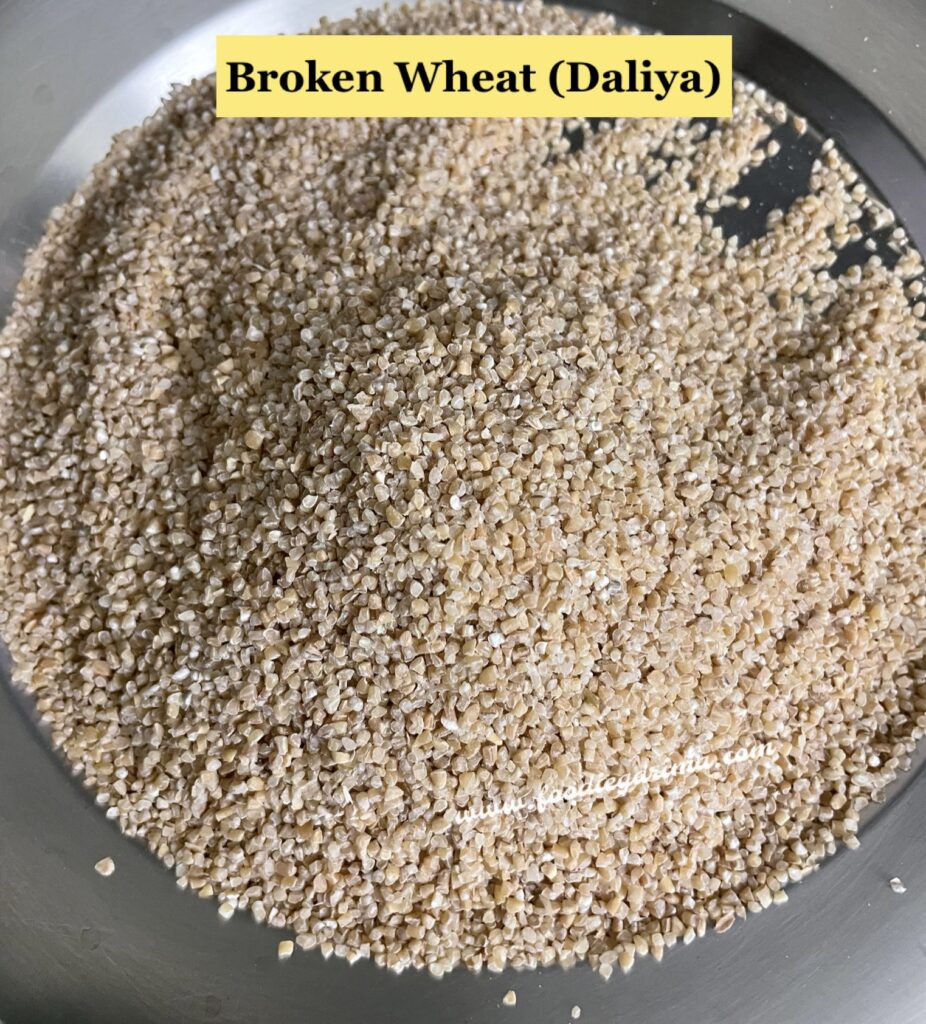
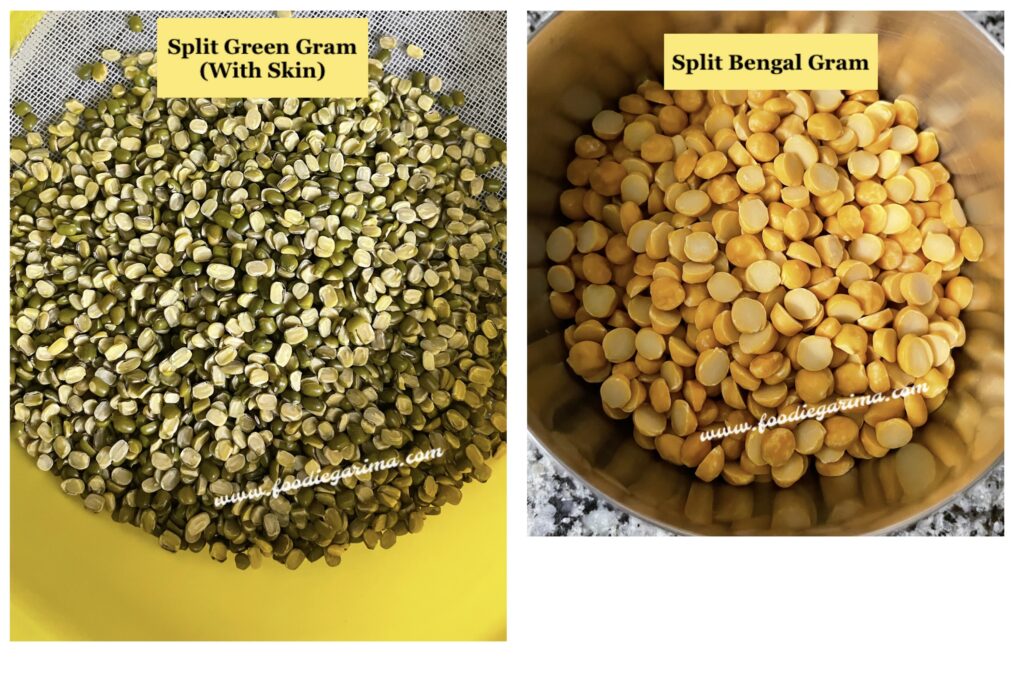
Why You’ll Love This Recipe
- Vegetarian & High in Protein
- Gentle on the stomach
- Quick to prepare, great for meal prep
- Perfect for weight loss and fitness goals
Ingredients:
| ½ cup or 200 Grams Broken wheat (Daliya) |
| ¼ cup or 90 Grams Chana Dal (split Bengal Gram) |
| ¼ cup or 90 Grams Moong Chhilka Dal (split Green Gram with skin) |
| 3 – 4 tsp Ghee (Clarified Butter) |
| 1 tsp Cumin Seeds (Jeera) |
| 1 tsp Salt |
| 4 cups Water |
Step-by-Step Instructions
Step 1: Soak the Lentils
- Wash and soak Chana dal and Moong Chhilka Dal in water for 8 to 10 minutes.
- This helps them cook faster and become easier to digest.
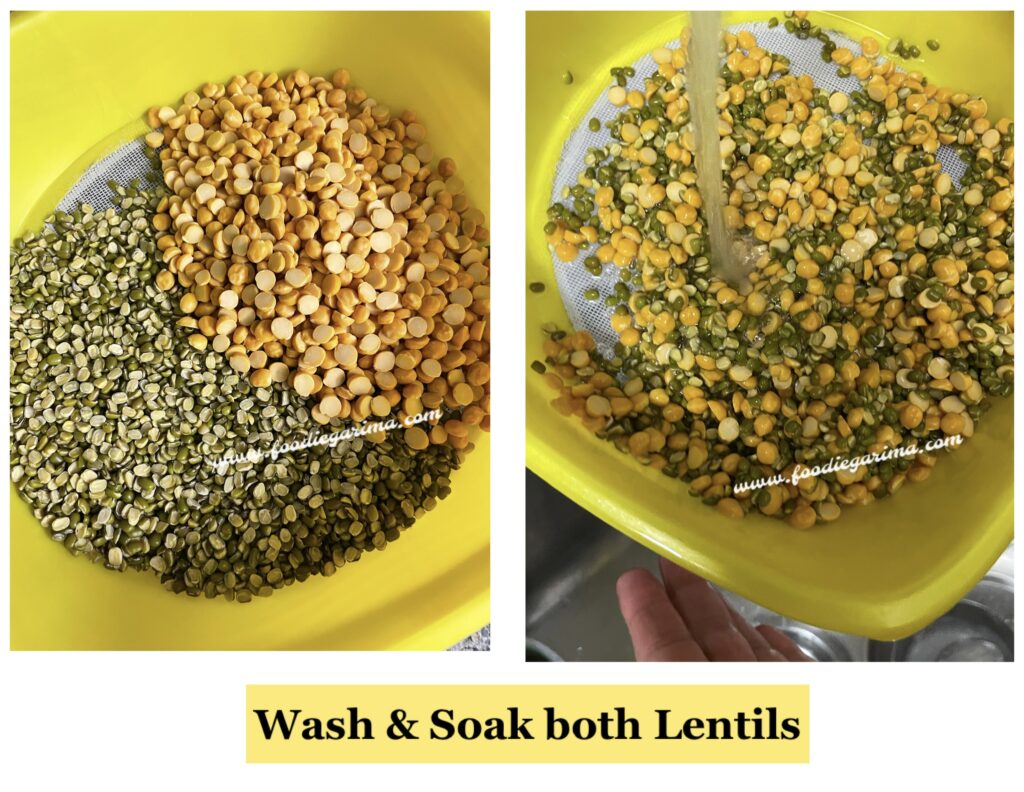
Step 2: Roast the Broken Wheat (Daliya)
- Give the Broken Wheat (Daliya) a quick check and clean it by handpicking any impurities, stones, or husk before cooking. Don’t wash the broken wheat for cleaning.
- In a pressure cooker, heat Ghee (Clarified Butter).
- Add cumin seeds, let them crackle.
- Roast the Broken Wheat for about 5 minutes on low to medium heat until it turns golden and aromatic.
- Once it is roasted, mix in Salt.
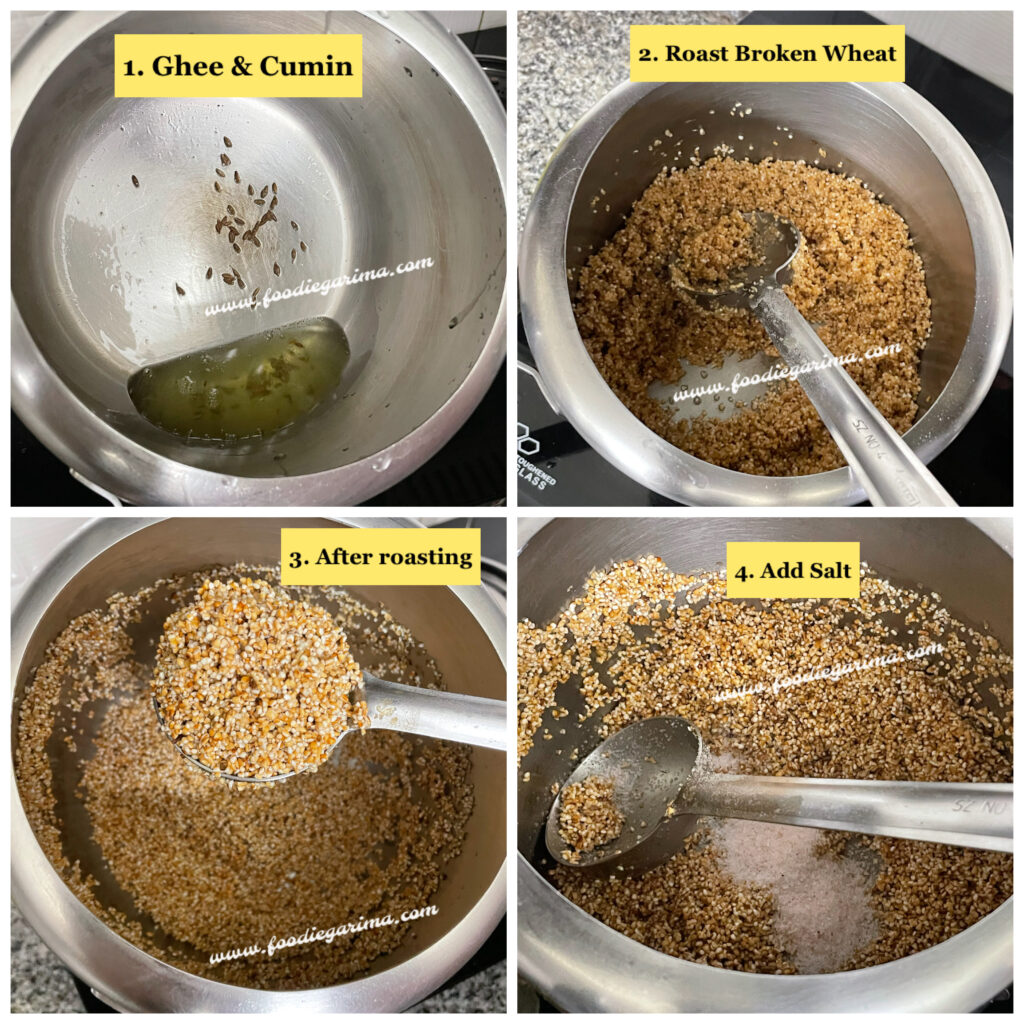
Step 3: Combine Everything
- Add the soaked Dals (drain water) to the roasted Broken Wheat, and 4 cups of water. (Don’t roast the Dals. Just soak them before using).
- Mix everything well.
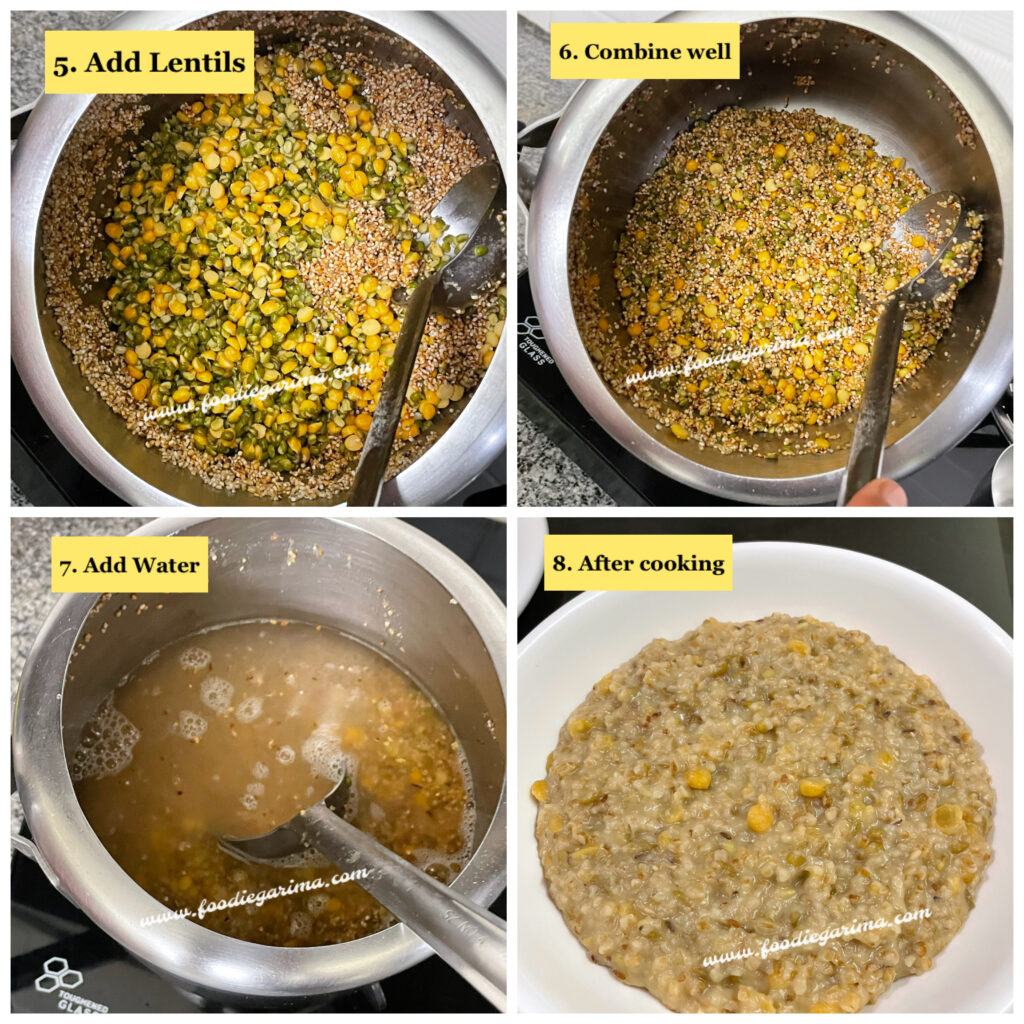
Step 4: Pressure Cook
- Close the lid and cook on high heat for 4 whistles.
- Let the pressure release naturally.
Step 5: Garnish and Serve
- Open the lid, mix well. If it’s too thick, add Hot Water to adjust consistency.
- Garnish with fresh coriander leaves and serve hot.
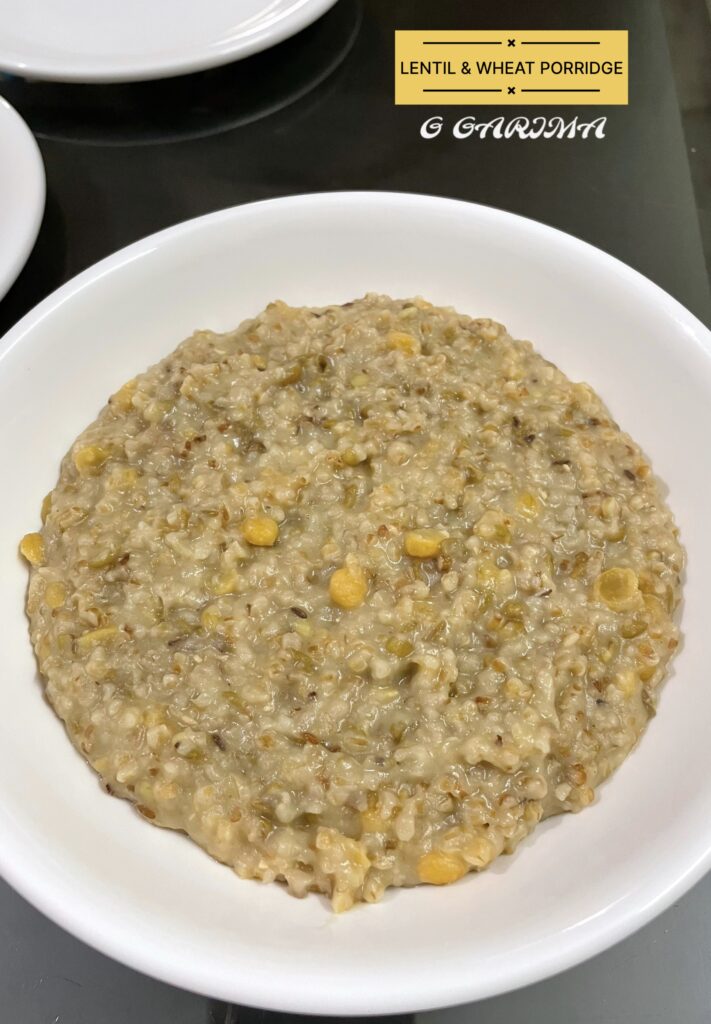
Serving Suggestions
Serve it hot, with a side of:
- Plain curd or raita
- Pickle (achar)
- Papad or roasted peanuts
This dish is a meal on its own—balanced, filling, and flavorful!
Common Mistakes to Avoid
Overcooking or Undercooking
No one likes mushy or half-cooked grains. Stick to 3 to 4 whistles in a pressure cooker for the perfect texture.
Skipping the Soaking Step
Soaking dals is not optional—it helps in digestion and faster cooking.
Not Balancing Spices and Salt
Always taste before serving. Too little salt or too much spice can ruin the dish.
Tips to Make It More Nutritious
Add Seasonal Vegetables
Pump up the fiber, flavor, and color with your choice of seasonal veggies. Think bell peppers, spinach, or even broccoli.
Use Ghee Instead of Oil
Ghee aids digestion and enhances taste without compromising health—just a spoonful goes a long way.
Spice It Up for Flavor Without Calories
Add ginger, green chili, or even garam masala for that extra zing without any guilt.
Nutritional Powerhouse: The Ingredients
Wheat Daliya (Broken Wheat) – The Wholesome Base
Broken Wheat (Daliya) is nothing but cracked or broken wheat, and it’s full of complex carbs and fiber. It digests slowly, keeps you full longer, and gives you sustained energy.
Chana Dal – The Protein Booster
Chana dal, aka split Chickpeas or split Bengal Gram, is loaded with protein and iron. It adds that much-needed muscle-repair punch and a nutty texture that makes this dish hearty.
Moong Chhilka Dal – The Digestive Hero
This Green Gram split dal is gentle on your tummy and brings in both protein and fiber. It’s perfect for digestion and ideal if you’re recovering or just looking for something light yet satisfying.
Other Optional Ingredients (Vegetables, Spices, Ghee)
Think of your fridge veggies—carrots, peas, beans—chop and toss them in! A bit of desi ghee for tadka and simple spices like jeera, haldi, and hing can take this dish to another level.
Who Should Eat This?
Fitness Enthusiasts
It’s the ideal post-workout meal. High protein, low fat, and carbs that fuel your energy.
Diabetics and People on Weight-Loss Plans
Low on the glycemic index, this recipe won’t spike your blood sugar.
Busy Professionals and Kids
Meal prep-friendly and super adaptable to everyone’s taste buds.
Benefits of High Protein Daliya
Muscle Recovery and Growth
Packed with plant-based proteins, this recipe helps your muscles recover post-workout. Great for gym-goers or anyone with an active lifestyle.
A Perfect Weight-Loss Meal
Low in fat, high in fiber, and filling—this dish helps control hunger pangs and curbs unnecessary snacking.
Keeps You Full Longer
That combo of protein and fiber means no mid-morning munchies. Say goodbye to unhealthy cravings.
Gut-Friendly and Heart-Healthy
The dals promote good gut bacteria, and the fiber helps keep cholesterol in check. It’s a win-win.
Meal Prep Ideas with High Protein Porridge
Store and Reheat Like a Pro
Refrigerate in an airtight container. Add a little water before reheating to bring it back to life.
Make-Ahead Breakfast Option
Cook the night before, reheat in the morning. Add a fried paneer cubes on top for a twist!
Use Leftovers Creatively
Make porridge cutlets. No one will guess it’s leftovers!
FAQs
Q1: Can I make this Porridge recipe in an Instant Pot?
Absolutely!
Q2: Is this recipe suitable for people with diabetes?
Yes! It has a low glycemic index and is rich in fiber and protein, which help regulate blood sugar levels.
Q3: What can I substitute for moong chhilka dal?
You can use yellow moong dal, masoor dal, or even toor dal as alternatives.
Q4: How often can I eat high protein Porridge?
It’s safe to consume 2-3 times a week or even daily if it fits your nutritional needs.
Q5: Can I make it sweet instead of savory?
Of course! Just skip the salt and spices (if using). Add milk, jaggery, and dry fruits for a delicious sweet version.